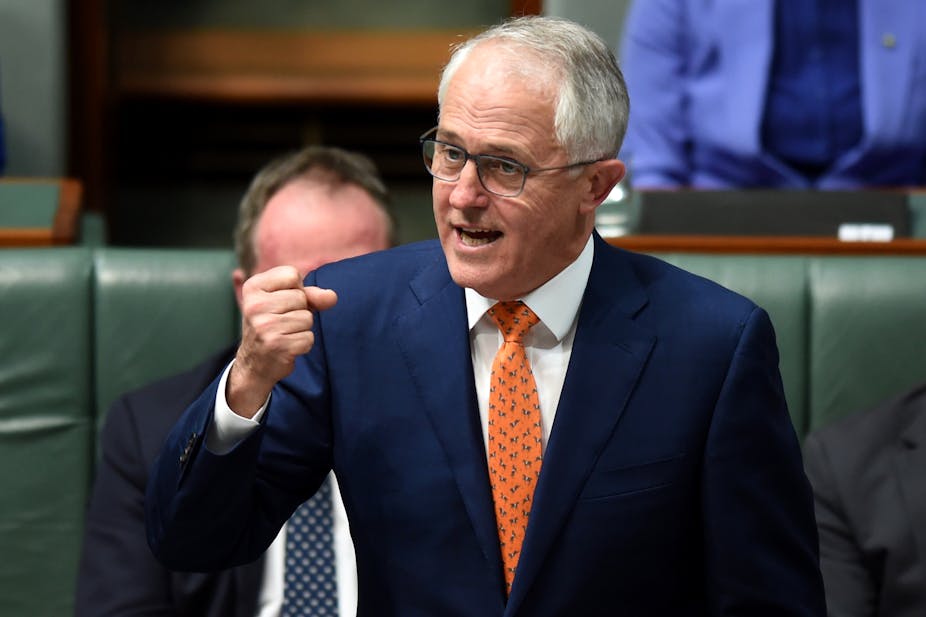When he displaced Tony Abbott as Liberal Party leader, Malcolm Turnbull ascended to what has traditionally been thought of as a position of some power within the party.
The Liberal Party is something of a top-down organisation in which the parliamentary leader forms the ministry and defines the party’s policy agenda. The party organisation exists not to give direction on policy, but to support the leader with resources to run election campaigns.
The partyroom is expected to get behind the leader to show unity and eschew ideology in order to maximise the party’s appeal to a pragmatic “middle Australia”.
As author Katharine West so succinctly put it, the Liberal Party was about “power without ideology”. Ideology, factions and organisations telling the parliamentary wing what to do were meant to be the burdens of the Labor Party.
So, the prerogatives of leadership were assumed to be available to Turnbull when he became leader. There was an expectation in some quarters of a shift in government policy away from some of the things that defined the approach of Abbott, his more socially conservative predecessor. This clearly has not happened.
Rather, there is an impression that the Coalition lacks direction on policy and is under siege from a group of ultra-conservatives who are fixated on matters like blocking marriage equality and unwinding racial vilification laws.
To add to his woes, the free-market economic hardliners who toy with ideas such as raising the GST rate and cutting government expenditure have also been hyperactive, driven partly by frustration with Turnbull’s dithering on economic policy.
The most charitable assessment right now would be that Turnbull appears to be struggling as prime minister. His inability to exercise the sort of influence that leadership is supposed to grant under Liberal Party rules is part of his problem.
One explanation for this might be that the old Liberal traditions no longer apply because the party itself has changed. The middle-of-the-road party West described has transformed into something more ideological. This may in turn reflect the nexus between the party members, who have significant powers over preselection, and the MPs they preselect.
In the safe seats in state and federal politics, and in the Senate tickets, the Liberal organisation is increasingly preselecting people of firm ideas espousing values-based politics. This might be about the need for conservative social values or free market economics.
Turnbull won his preselection for Wentworth in 2004 on the back of a good old-fashioned branch-stack. This involved marshalling friends and associates to displace sitting Liberal member Peter King – much to the annoyance of the NSW Liberal organisation at the time.
That preselection was a throwback to the old days before the dominance of rigidly disciplined political parties. Back then, a notable local could gather supporters from the local parish to elect him, after which he might participate in the leadership politics of the parliament.
It even resonated with the type of candidate that was common during the Menzies era – male, a success in business or community affairs, critical of unions, holding moderately liberal or conservative outlooks, but also pragmatic.
These days Liberal preselections are a battlefield in which branch-member ideologues or members of various factions (“moderates”, “conservatives”, “uglies”, “Krogerites”, “Costelloites” and so on) slug it out. The partyroom reflects the success or failures of the contest.
With his old-school preselection, his association with causes such as republicanism, and his moderate, modern and cosmopolitan views, Turnbull is something of an odd-man-out in the contemporary Liberal Party. That he should end up being its parliamentary leader not once but twice is testament to his ambition and tenacity.
To grab the leadership is an achievement. But to be able to consolidate and survive (let alone actually do anything) is something else again.
Insights on how to do it can be gained from successful past Liberal leaders Robert Menzies, Malcolm Fraser and John Howard. They all had internal critics, enemies and rivals, and all had firm views on some issues. But they were good at keeping the parliamentary wing unified and disciplined, sometimes with clever strategies.
Howard, for example, was adept at utilising conscience voting to deal with morality issues that had the potential to divide his partyroom.
Howard, as a social conservative himself, was also very good at absorbing the occasional defeat on some of these conservative causes. That’s because he had a more urgent aspiration: to keep his party united (mindful, no doubt, of the mayhem caused by people like Andrew Peacock and Joh Bjelke-Petersen during those bleak years in opposition between 1983 and 1996).
Menzies, Fraser and Howard were also adept at winning elections. Interestingly, Abbott’s electoral success didn’t save his leadership, because opinion polls have become a major test of leadership viability. This is hardly surprising, for wanting to win elections is the thing that binds moderates, social conservatives and everyone else in the party room.
So now we get to the essence of Turnbull’s leadership problem, of which the agitation of the Cory Bernardis in the partyroom is only a minor part. If Turnbull had any authority as leader when he took over from Abbott, it dissipated completely at the 2016 election. Any leader who loses 13 lower house seats and allows the populist right to consolidate in the Senate – after promising to get rid them – is not in a great political position.
In truth, Turnbull is not going to be able to do anything more than grimly hang on and hope that either the opinion polls don’t go down further or the memory of Labor’s leadership woes stops his colleagues from putting him to the sword.
Turnbull is an odd moderate in a party with many liberal economic and socially conservative hardliners. That he nearly lost an election and helped revive the political career of Pauline Hanson will severely test his ambition and tenacity.

